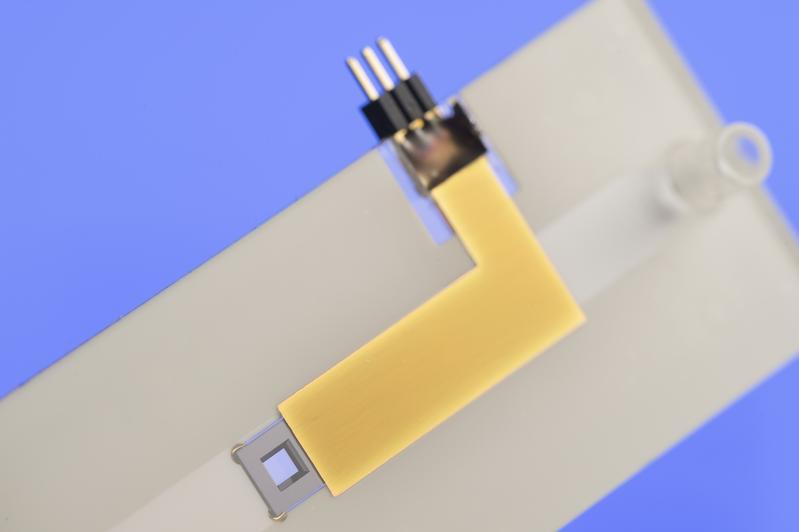
Alternative methods to animal testing: VISION – A microfluidic chip system as an alternative to animal experiments

Microfluidic chip system for the cultivation of different cell models under physiologically relevant conditions.
Bernd Müller / Fraunhofer IBMT
Animals as model organisms have so far often been essential for pharmaceutical research – they often provide important information on the efficacy of drugs or the safety of chemicals to humans.
The protection of animals is opposed to the need to provide safe and appropriate medicines for humans.
In Germany and at the EU level there are strict legal restrictions on animal experiments. Suitable alternative methods should help to reduce and avoid animal experiments.
The Federal Ministry of Education and Research supports the development of alternative methods by funding around 600 scientific projects since 1980 with a total funding volume of more than 190 million euros
Microfluidic chips and analysis systems as an important contribution to animal welfare
These days, scientists are researching on so-called microphysiological systems that simulate and interlink various organ systems of the human body, such as the liver, lung, kidney or nerve cells.
In this context, the BMBF project “VISION”, launched in June 2019, aims to reduce animal experiments by developing a special analysis platform. It consists of the combination of a microfluidic organ culture system (in vitro) and bioinformatic (in silico) analyses of disease mechanisms.
“VISION” develops and validates the in vitro/in silico analysis platform especially for toxicological inhalation studies, which could reduce animal testing in regulatory, application-oriented and basic research. At the same time, the microfluidic chip system creates new possibilities for mimicking various cell and tissue types in vitro in order to generate biological, pharmacological and toxicological data for in silico method development under physiologically relevant conditions.
Biomedical engineering as well as biological-medical and pharmaceutical science from Saarland are closely cooperating to develop the “VISION” analysis platform based on a combination of (a) an in vitro lung-liver model, (b) bioinformatic analysis methodology and (c) the integration of clinical data, which enables detailed biological, pharmacological and toxicological analysis.
Within the framework of the joint project, the Fraunhofer Institute for Biomedical Engineering IBMT has taken on the task of developing and optimizing sensitive in vitro systems (lung model and liver model) for mimicking the lung barrier and the metabolism process in the liver and their integration into microfluidic systems to determine specific effects of pollutants or therapeutic agents after pulmonary uptake into the organism.
Using these methods, meaningful in vitro analyses are performed to generate well-founded data sets as a basis for the development of the in silico model.
In “VISION”, the two consortium partners combine their respective expertise. The Fraunhofer IBMT contributes in particular with the production of the microfluidic chip system and the human toxicological analysis systems connected to it.
Saarland University, Medical Clinic V, is coordinator of the project, contributes clinical data and is particularly concerned with questions of cell biology and specific disease models, such as COPD. The Faculty of Pharmacy at Saarland University is developing the bioinformatic analysis methods.
Project funding: BMBF, No. 031L0153B
Duration: 06/2019-05/2021
Project partners (Germany):
Saarland University (coordination), Clinic for Internal Medicine V, Prof. Dr. Dr. Robert Bals
Saarland University, Clinical Pharmacy, Prof. Dr. Thorsten Lehr
Fraunhofer Institute for Biomedical Engineering IBMT
Project manager at the Fraunhofer IBMT:
Prof. Dr. Heiko Zimmermann
Head of Institute
Phone: +49 6897 9071 100
E-Mail: heiko.zimmermann@ibmt.fraunhofer.de
Contact at the Fraunhofer IBMT:
Dr. Yvonne Lydia Kohl
Group Manager Nanotoxicology
Phone: +49 6897 9071 256
E-Mail: yvonne.kohl@ibmt.fraunhofer.de
https://www.ibmt.fraunhofer.de












